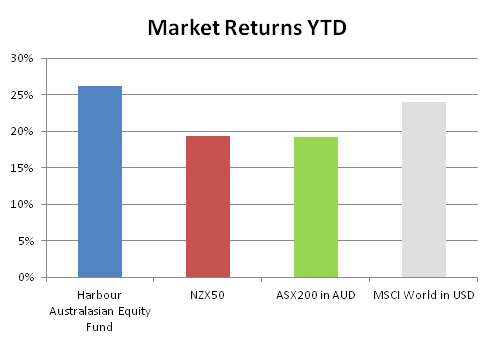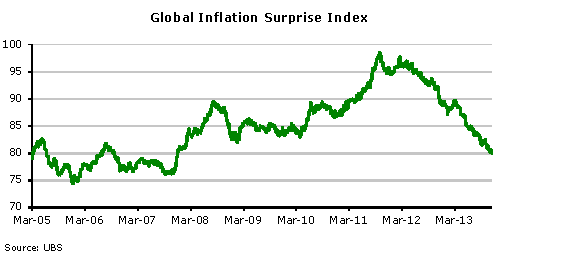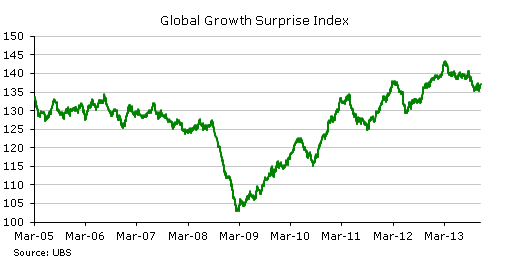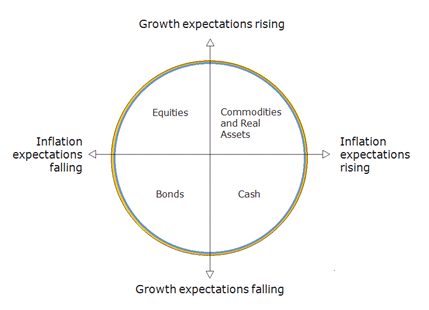2014: Facing Different Risks and Rewards
Harbour Investment Chronometer: At this time of year we are inundated with outlook research pieces. We have reviewed some 48 global forecasts from investment banks, research houses and global fund managers to try to ascertain the consensus and a shared view of the risks ahead.
Friday, December 13th 2013, 10:43AM
by Harbour Asset Management
Only four months ago markets were worried; concerned about the mid-year growth pause, the US fiscal cliff, German elections, policy change in China, replacement of the Federal Reserve chair and, of course, tapering of US bond purchases. As each event unfolded favourably, equity markets embraced reduced uncertainty. Our portfolio remained fully invested through this period as we focussed on stock specific earnings outcomes and prospects. It is fair to say that we have been more optimistic than most on global and New Zealand growth.
Global equity markets are up some 24% year to date and the New Zealand equity market has almost kept up rising 19%, Harbour’s portfolio is up 26% in gross terms in the first 11 months of 2013.

Source: Harbour, Bloomberg, Past performance may not provide an appropriate guide to future performance.
In our opinion the prospects for the world economy remain better in 2014 than in 2013.
However, equity markets are no longer cheap, and global bond yields may not have fully adjusted to the prospect of strengthening growth. Some stretch in valuations means that any failure to meet earnings targets, or a setback in growth expectations, risks a pull back in equity prices. Having said that, as noted by London based Absolute Strategy Research, "history tells us that global equities tend to beat global bonds when unemployment is falling".
From this perspective, while central banks have their eye on employment, the path of least resistance for equities remains up. It is clear that employment and inflation remain key for equity market performance in 2014.
On the inflation front, the surprise globally has been ongoing downgrades to price inflation forecasts. Asia, the US and Europe have all seen lower than expected consumer and producer price inflation over the last six months. This has been good news for both bonds and equities.

Stronger business confidence is one of the reasons we are expecting a good start to 2014. We also think that low inventories will prompt a stock building cycle, while at the same time fiscal contractions are lessening as a negative force. The investment and construction cycle is also moving forward, albeit at a more glacial pace than previous cycles. If growth is to be sustained, companies need to use excess cash on their balance sheets to invest and continue to lift employment.
 From an Australasian perspective, strengthening industrial output in Asia over the past six months augers well for export growth. The combination of Japanese reflation and Chinese reform has given a further lift in Asian business confidence indicators.
From an Australasian perspective, strengthening industrial output in Asia over the past six months augers well for export growth. The combination of Japanese reflation and Chinese reform has given a further lift in Asian business confidence indicators.
A stronger global economy ought to presage better commodity markets. Hard commodity prices have been in the doldrums in 2013, although iron ore prices have exceeded consensus expectations all year. As we read it, the market is split on the outlook for commodity prices, with those typically in the slower growth camp calling for further under-performance in 2014. In contrast those like us expecting a stronger Asian recovery, and seeing the appointment of Yellen as new Federal Reserve Chair as more pro-growth, are more positive on commodities. Our assessment is that growth surprises may provide a solid start for commodity markets in 2014.

Source: Harbour
Australia the odd one out?
The consensus remains muted on the outlook for Australian growth. Despite a favourable election outcome, 2014 growth expectations for Australia have settled at around 2013 levels.
As the Australian economy transitions from mining investment to a broader export and domestic demand recovery, there are risks in timing. Commentators are quite divided on the near term outlook, and that is why the Australian interest rate market from time to time still prices in another cut in rates.
We think it is unlikely that Australia needs another cut in rates as many leading indicators are pointing to an upturn in domestic growth. Housing investment is lifting and consumer confidence has also recovered. The signals however are patchy, but one of our strongest non-consensus calls is that the market will be positively surprised by the Australian economy.
In 2013 the Australian equity market reflected investors chasing yield (banks and defensives) and high quality industrials (in particular healthcare stocks). Cyclical and resource stocks have generally been under-performers. As global growth recovers we see further upside in global cyclicals and potentially the better quality resource names.
A transition towards domestic Australian cyclicals is also possible as investors gain confidence in the recovery. This rotation may be important for many New Zealand industrial and retail names as there is potential for positive earnings surprises from their Australian operations.
NZ: Strong growth shadowed by an election year
The consensus has caught up with a strong New Zealand growth story. Many domestic cyclical stocks performed strongly in 2013.
The outlook for growth also has some strong structural elements:
- The rebuild of Christchurch commences in earnest
- Net migration supports demand
- Stronger Asian growth and Free Trade Agreements lift exports
- The terms of trade stays elevated with the dairy sector providing strong income and investment
- Productivity gains continue through adoption of on-line business and consumer models
But there are risks to the demand outlook and the markets are just moving to gauge these issues, namely:
- The recently introduced loan-to-value ratio (LVR) mortgage lending limits appear to be having an effect.
- Businesses may hold back on investment and employment as they reflect on potential policy risks.
- Capacity and skill constraints may provide an inflation surprise.
The consensus is very sanguine on New Zealand inflation - we doubt the Reserve Bank will be if inflation pressures emerge. And finally, while our central view is one of a strengthening global economy, the outlook remains partly clouded by risks associated with the eventual normalisation of monetary policies.
The most significant of these risks is likely to be the election because as of today it remains too close to call. While a strong growth and employment environment ought to be good for National as the incumbent, polling and the recent Christchurch by-election suggests a much closer contest.
It is clear what markets think. In reaction to the recent strong Christchurch by-election result for Labour, the prices of the listed electricity companies sold off sharply.
The overall equity market also under-performed, reflecting the contrast in market perceptions of policy differences. Rather than saying that a Labour/Greens election win next year will be bad for markets, investors need to decide at what point the market has "over-anticipated" the potential impact of policies that may or may not be implemented.
Despite the cloud of policy uncertainty, we suspect that 2014 may provide significant opportunities for investors.
Recent parliamentary stances taken on Chorus provide a further catalyst for investors to be wary in an election year. Whatever the merits (and Harbour's several submissions on the UFB process are in the public domain) we have some sympathy for global and Australian investors who say it has just got too hard to judge the probabilities of regulatory outcomes in New Zealand, and it is instead easier to focus on alternative global investments. Even from an Australasian perspective, the greater certainty of regulation in Australia increases the likelihood of our finding attractive longer term utility investments across the Tasman.
Although few sectors are unscathed by policy risks, we tend to prefer globally facing cyclicals and companies in sectors where we can identify strong structural tail winds.
We continue to think that demographic trends are not fully priced in markets. The latest New Zealand census released this week, continues to portray the key trends of increasing aged care requirements, of more spending on travel and leisure, and greater healthcare needs. These are global trends. Coupled with rising Asian demand, they set the scene for stronger revenue and profit growth in some sectors relative to other sectors. We remain attracted to travel, healthcare and dairy related opportunities.
At the same time technology and changing household preferences in on-line shopping and entertainment require careful consideration. Technological change continues at a rapid pace and whilst incumbents like TradeMe and Sky Network have powerful franchises they can become exposed to disruptive technologies, and both need to continue to innovate and invest.
The technology sector provided challenges for investors in 2013, and is likely again to be a feature of significant discussion next year. Xero provided excellent returns for investors in 2013, while a raft of other technology companies listed in the year providing a broad choice for investors. This sector is very news dependent, and as we have seen with Pacific Edge Biotech, cracking the US market is key. 2014 is an important year for a number of listed New Zealand technology companies and our approach continues to be to take a prudent portfolio approach with smaller positions taken until we have confidence in both the revenue model, and the line of sight to cash flows and profit.
Global cyclicals, secular growth & potentially Australian recovery the key focus
Fletcher Building, Mainfreight and Fisher & Paykel Healthcare are key portfolio positions. Extended valuations mean we have trimmed positions in Auckland Airport and Ryman Healthcare, although both remain significant in the portfolio. Among other New Zealand large caps we have recently been buying Telecom, more so from a very underweight position than anticipating a strong market reaction to next year’s earnings announcement.
Among our mid cap stocks, we think strong growth prospects for Synlait Milk, A2 Corporation and Summerset are not fully reflected in prices, although investors will need to look through to 2015 earnings to gain valuation comfort for these and many strong growth stocks.
In Australia, the portfolio retains no banks and we recently also sold Suncorp. The banks not only look fully priced, but other than improving impairments they are showing little in the way of earnings growth. The forthcoming Murray banking sector review may be light handed, but we also think that interest rate margins have peaked. It would most likely take a strong credit cycle to change our view.
The portfolio exposures in Australia had a banner year in 2013. Flight Centre, Seek, Ardent Leisure, Macquarie Bank, CSL, and Amcor all provided strong returns. Earlier in the year ANZ, Westpac, NAB and Suncorp also significant added value before we sold them.
Now the portfolio is changing. We have introduced Perpetual and LendLease to gain domestic exposure, and OzForex and FlexiGroup to add consumer financial growth.
However, the largest Australian position is BHP. Although the stock has recovered, we think that 2014 provides a stronger outlook for both the sector and BHP specifically as the company focuses on cash flows.
2013 a vintage year for equities, 2014 a banner year for growth
Strong dairy prices, migration growth, higher house prices, still accommodative monetary policy , strengthening global growth and the Christchurch rebuild have characterised 2013. Investors have had time in 2013 to build stronger growth into their projections. The equity market is up, bond yields are higher, and we expect higher official cash rates in 2014.
A year ago we wrote at length about the likely normalisation of equity risk premiums. That has happened in New Zealand. Our composite valuation indicator is now stretched. The risk reward in having extended equity risk in the New Zealand market has diminished. The New Zealand market is less cyclical and less about growth following the IPO listings this year. Ironically the higher regulated industry weight provides a higher risk for 2014 - the election year.
Nevertheless we still expect equities to outpace bonds in 2014, but not by as much as experienced in the last two years.
Andrew Bascand and Craig Stent
Important disclaimer information
| « Will the QE trick continue? | Hamish Douglass Unplugged - Latest Video from Adviser Briefing - August 2012 » |
Special Offers
Comments from our readers
No comments yet
Sign In to add your comment
| Printable version | Email to a friend |









